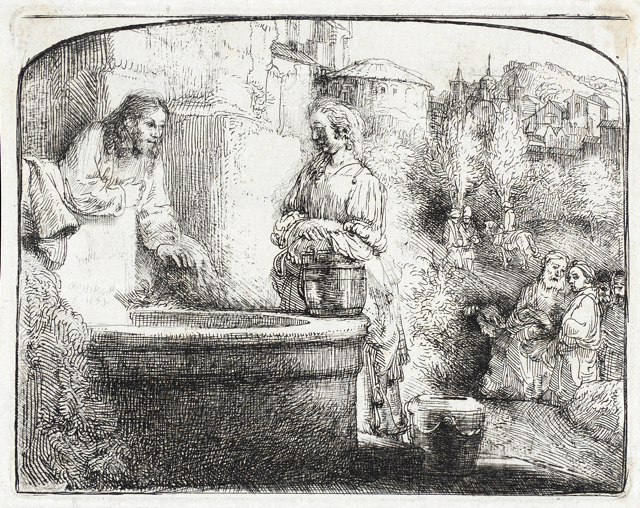
Christ and the Woman of Samaria: An Arched Print by Rembrandt |
3 Lent
Ex. 17:1-7 • Ps. 95 • Rom. 5:1-11 • John 4:5-42
An interpretation, however hallowed, and even if embedded in the story, should not substitute for a careful and slow reading. “The Israelites quarreled and tested the Lord”; “your ancestors tested me, and put me to the proof” (Ex. 17:7; Ps. 95:9). The interpretation is a teaching moment: “Do not harden your hearts, as at Meribah, as on the day of Massah in the wilderness” (Ps. 95:8). Indeed, the quarreling, testing, and hardening of heart brought a severe judgment: “They shall not enter my rest” (Ps. 95:11). Is there another way to hear the story?
“From the wilderness of sin the whole congregation of the Israelites journeyed by stages, as the Lord commanded. They camped at Rephidim, but there was no water for the people to drink” (Ex. 17:1). They complained, “Why did you bring us out of Egypt, to kill us and our children and livestock with thirst?” (Ex. 17:3; emphases mine). In a desert climate, thirst is a dreaded threat and a cruel killer. These few well-known lines help fill out the story: “My mouth is dried out like a potsherd, and my tongue sticks to my jaws; you lay me in the dust of death” (Ps. 22:15). The people have every reason to wonder and fear: “Can these bones live? (Ezek. 37:3). This is a story about God and his people and desperate human need.
He who is in the bosom of the Father becomes the flesh and blood of humanity. “Jesus, tired out by his journey, was sitting by the well. It was about noon. A Samaritan woman came to draw water, and Jesus said to her, ‘Give me a drink’” (John 4:6-7). They meet in mutual need that serves, in part, to overcome ethnic, religious, gender, and ceremonial proscriptions. Although “Jews do not share things in common with Samaritans,” Jesus boldly breaks down this dividing wall and asks for aid from an alien woman. Samaritans, it must be remembered, practiced a religion especially repugnant to Jews because it was in many ways similar to their own. Samaritans, so the Jews thought, practiced a defective Judaism mixed with heathen elements. Indeed, Jesus reminds the woman that “salvation is from the Jews” (John 4:22). Still, Jesus speaks with her, and seeks her help. He meets her as a fellow sufferer.
Turning his attention to the woman’s need, Jesus says, “If you knew the gift of God, and who it is that is saying to you, ‘Give me a drink,’ you would have asked him and he would have given you living water” (John 4:10). He explains, “The water that I will give will become in them a spring of water gushing up to eternal life” (John 4:14). Her tongue, dried like a potsherd, will taste in the revelation and inflowing spirit of Jesus a pure water of satisfaction. Indeed, the font of this water will be in her and will overflow. She will be where Jesus is, and drink the cup he gives. She will have access to this grace exactly where she stands (Rom. 5:2).
Jesus is in need, too. He thirsts. His body craves and his heart aches for satisfaction. Deep down, he thirsts for the faith of this woman (St. Augustine, Commentary on St. John, Tract 15). After Jesus drew her out and awakened her faith, “many Samaritans from that city believed in him because of the woman’s testimony” (John 4:39). One by one, the font of faith erupted: “We have heard for ourselves, and we know this is truly the Savior of the world” (John 4:42).
The Church continues to put a cup of water in immigrant hands, and to give the drink of new life.
Look It Up
Read Romans 5:5. Sip this.
Think About It
Boast of your need.









